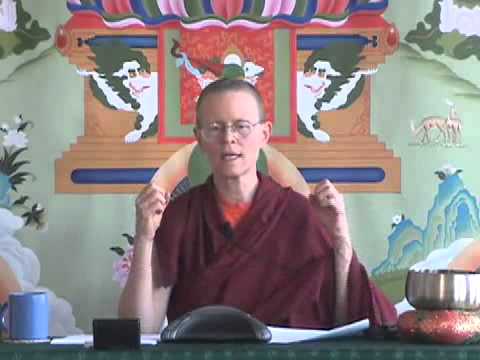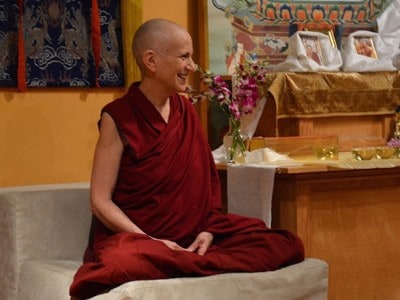Overwhelmed?
In this Bodhisattva's Breakfast Corner talk, Venerable Thubten Chodron discusses the meaning of the term "joyous effort" and how the mind we bring to a situation can determine whether we can feel joyous effort or whether we feel overwhelmed.
I was thinking this morning about joyous effort and how important it is, and how effort is one thing but joyous effort is another thing. Some people, in fact, translate the term [tsun dru?] instead of as joyous effort, as enthusiasm. In other words, the mind is enthusiastic, it’s delighted, you’re in a good mood, you’re eager, you’re ready to go, you feel happy with what you’re doing, you feel satisfied after you’ve done it, you feel like you’ve created virtue and you have something to dedicate and you’re happy to keep going and you know how to pace yourself and when to rest. It’s a really important mind for Dharma practice and just for regular life practice.
I was thinking, the one phrase that you hear a lot in modern society is, “I’m overwhelmed.” Sometimes we even say it, don’t we? “I’m overwhelmed.” I was asking myself, “Well, what does overwhelmed mean?” We say it a lot, we seem to think we know what we mean by it, but what actually does feeling overwhelmed mean? What is this feeling of feeling overwhelmed? Where does it come from? Is it the situation that is overwhelming? Is it our mind saying, “I feel overwhelmed?” Because I know for myself, as soon as I use the word “overwhelmed” and say, “I feel overwhelmed,” then everything changes. Before I give it that label, before I say that sentence, there’s one thing happening. As soon as I say, “I feel overwhelmed,” the whole paradigm shifts to, “I’m overwhelmed, it’s too much. Don’t ask anything more from me. I can’t do it. Stop pushing. This is just too much and leave me alone, thank you very much.”
I feel like it’s all coming from outside, at me, and I’ve got to stand my ground that I am overwhelmed. I have plenty of energy to stand my ground that I’m overwhelmed, plenty of energy for that, but no energy to do what it is that I feel overwhelmed by. Isn’t that interesting, yes? I don’t know if you guys are like that, but it’s the way I watch my mind. There’s energy to, like, dig in my heels, and there’s plenty of energy for a pity party, because a pity party takes energy, it doesn’t just happen all by itself. It’s, “I’m overwhelmed. Leave me alone. Don’t ask me to do this.” Plenty of energy for that, but no energy to do whatever it is that somebody, or maybe nobody, is asking me. It’s a very interesting state of mind. Sometimes we use these words in our normal language, and we think we know what we mean, but to really stop and say, “What do I mean by this?” When I say I’m overwhelmed, what actually is going on? Dissect it a little bit, observe it a little bit. It’s quite interesting. I remember a few years ago when we had EML we had a discussion about the phrase “I need my own space,” because that’s another one you hear so much, don’t you? “I need my own space. It’s too much. Give me space, MY own space.”
We had a fascinating discussion about what it means when we say, “I need my own space.” What does that mean? Does it mean a physical space? Does it mean a mental space? Can somebody else give us mental space or do we need to give ourselves mental space? And what is this space anyway? Yes? We want this space—my space—but what is it? I find these kinds of things very interesting to reflect on because it helps me understand my mind better, to see how I use certain words and tell myself something, and when I use those words and tell myself that, how I change the whole experience. It’s not coming from outside, it’s coming from the words I use to describe it.
Think about that and how it relates to joyous effort. What are the words you use to describe your situation when you have joyous effort? Because you can have one situation, yet one person feels overwhelmed, and another person needs their own space, and another person has joyous effort. It’s not the situation. What do these terms mean? What are we referring to and what causes those different states of mind in us? Something to research a little…
But now I’m overwhelmed by it all and I need some space, so turn off that camera! [laughter]
Venerable Thubten Chodron
Venerable Chodron emphasizes the practical application of Buddha’s teachings in our daily lives and is especially skilled at explaining them in ways easily understood and practiced by Westerners. She is well known for her warm, humorous, and lucid teachings. She was ordained as a Buddhist nun in 1977 by Kyabje Ling Rinpoche in Dharamsala, India, and in 1986 she received bhikshuni (full) ordination in Taiwan. Read her full bio.


